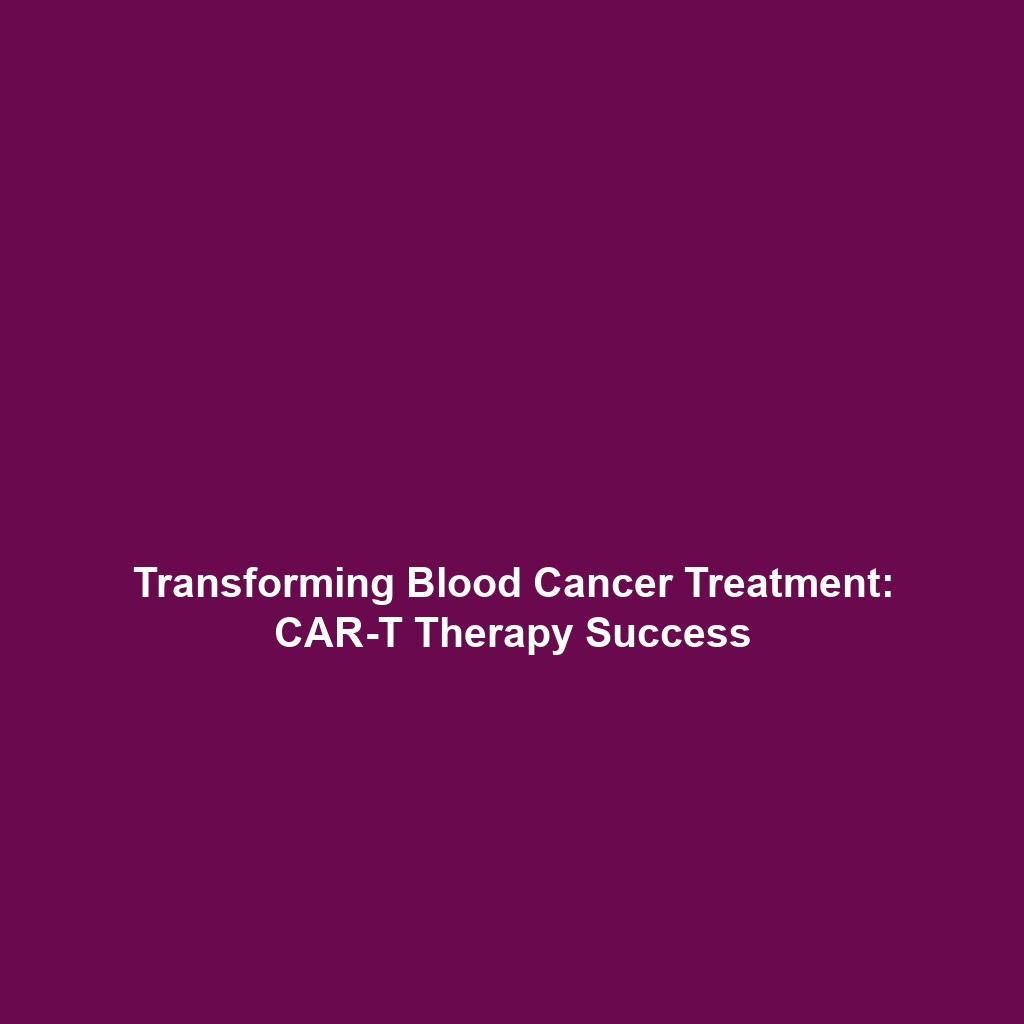Blood Cancers and CAR-T Therapy: CAR-T Therapy’s Success in Treating Hematologic Malignancies
Introduction
Blood cancers, or hematologic malignancies, pose significant challenges to healthcare, affecting millions globally. CAR-T (Chimeric Antigen Receptor T-cell) therapy has emerged as a revolutionary treatment, showcasing remarkable success rates in targeting these malignancies. Essential to the broader landscape of immunotherapy and cancer, CAR-T therapy exemplifies how innovative biotechnological advances are reshaping oncology. By harnessing the power of the immune system, researchers and clinicians are now able to devise personalized treatment strategies that offer hope for patients with limited options.
Key Concepts
Understanding Blood Cancers
Blood cancers, including leukemia, lymphoma, and multiple myeloma, result from abnormalities in blood cell production. They disrupt normal hematopoiesis, leading to uncontrolled cell proliferation. Key terms in this category include:
- Hematopoiesis: The process of forming new blood cells.
- Malignancy: Cancerous growths that invade and destroy surrounding tissues.
Principle of CAR-T Therapy
CAR-T therapy operates on the principle of modifying a patient’s T-cells to better recognize and attack cancer cells. By genetically engineering T-cells to express CARs, these immune cells can specifically target antigens present on cancer cells. This approach has revolutionized treatment paradigms within immunotherapy and cancer.
Applications and Real-World Uses
CAR-T therapy has found significant application in the treatment of various blood cancers:
- Acute Lymphoblastic Leukemia (ALL): CAR-T therapy has shown high remission rates among pediatric patients.
- Diffuse Large B-cell Lymphoma (DLBCL): CAR-T therapies tailored to target CD19 have led to substantial improvements in outcomes.
These applications highlight how CAR-T therapy is used in blood cancers, showcasing its potential to provide effective treatments in a challenging category of malignancies.
Current Challenges
Despite its success, several challenges persist in the study and application of CAR-T therapy:
- Limited Availability: Production of personalized CAR-T cells is resource-intensive.
- Cytokine Release Syndrome (CRS): Patients may experience severe side effects due to the rapid activation of the immune system.
- Cost: High expenses limit access for many patients.
These challenges of CAR-T therapy underline the necessity for continued research and development in the field of immunotherapy and cancer.
Future Research and Innovations
Future directions in CAR-T therapy research aim to address current limitations while enhancing efficacy. Innovations may include:
- Next-Generation CARs: Developing CARs that can target multiple antigens on cancer cells.
- Armored CAR-T Cells: Engineering T-cells with additional therapeutic functions, potentially reducing side effects.
- Combination Therapies: Integrating CAR-T with other therapies, such as checkpoint inhibitors, to improve outcomes.
These advancements signify a promising future for blood cancers and CAR-T therapy within the ever-evolving domain of immunotherapy and cancer.
Conclusion
In summary, CAR-T therapy represents a monumental advancement in the treatment of blood cancers, demonstrating significant potential within the realm of immunotherapy. While challenges remain, ongoing research and technological innovations promise to optimize its use, thereby enhancing patient outcomes and quality of life. For more information on the topic, please explore our articles on related immunotherapy advancements and innovations in cancer treatment.

Leave a Reply